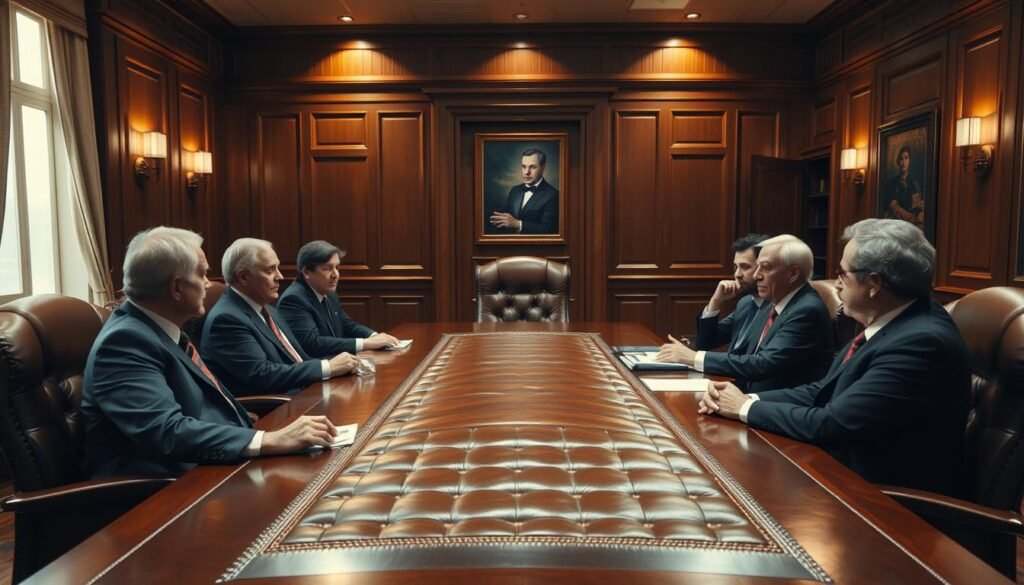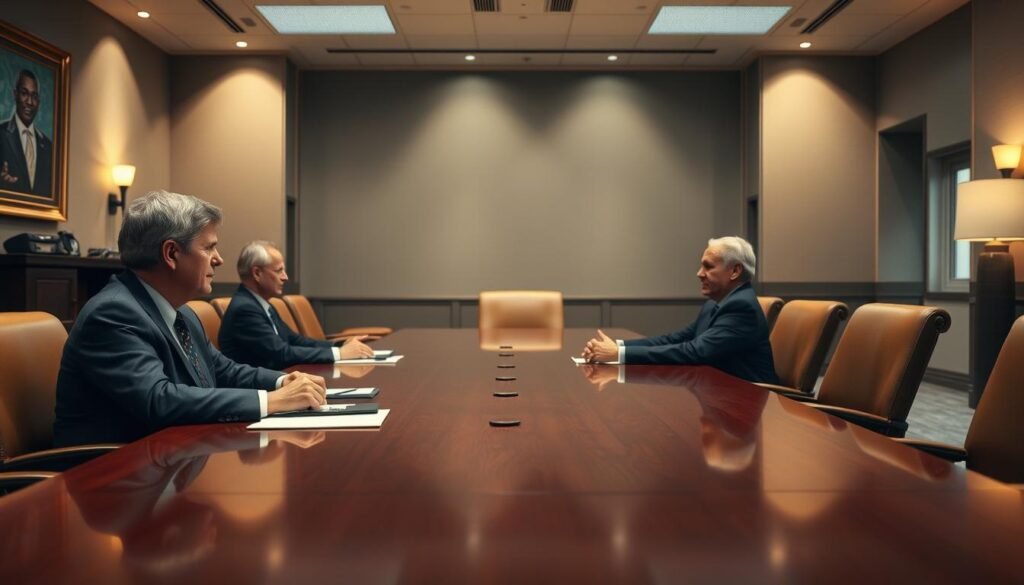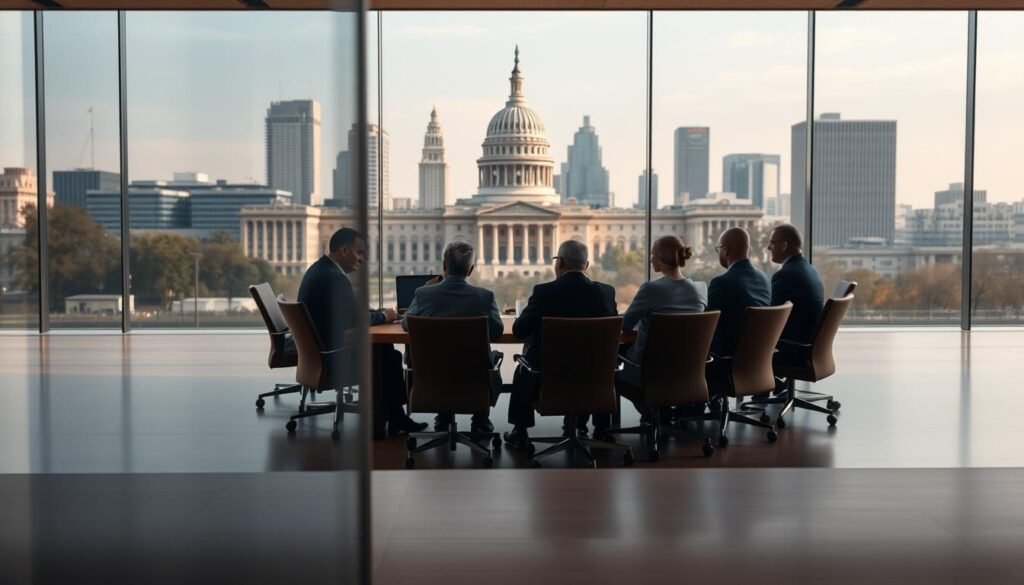Senator Retracts Claim That Kennedy’s Meeting With C.D.C. Director Was Recorded

Senator Markwayne Mullin initially claimed that a meeting between Kennedy and the C.D.C. director was recorded, sparking controversy over government transparency.
The senator later retracted the statement, raising questions about the accuracy of his initial claim and its implications for transparency in government.
This development has significant implications for the public’s understanding of government proceedings and the level of transparency in high-level discussions.
Key Takeaways
- The senator’s initial claim suggested a recorded meeting between Kennedy and the C.D.C. director.
- The retraction has sparked debate over government transparency.
- The incident raises concerns about the accuracy of public statements.
- Transparency in government is crucial for public trust.
- The controversy highlights the need for clear and accurate information.
The Initial Claim and Its Context
The controversy began when Senator Mullin made a claim about a recorded meeting between Kennedy and the C.D.C. director during a Senate committee hearing. This claim was significant because it involved accusations of dishonesty against the C.D.C. director regarding the nature of the conversation.
Details of the Senator’s Original Statement
Senator Mullin accused the C.D.C. director of being dishonest about a conversation with Kennedy. The senator’s statement was made under oath during the committee hearing, lending gravity to the accusation. The exact wording of the senator’s claim was that the C.D.C. director had misled the committee about the recording of the meeting.
The senator’s accusation was not just about the existence of a recording but also about the C.D.C. director’s integrity. This was a serious allegation that had the potential to undermine the director’s credibility and impact the ongoing committee work.
Timing and Platform of the Claim
The claim was made during a Senate committee hearing, a formal setting that is typically characterized by a level of decorum and respect among participants. The timing and platform of the claim added to its significance, as it was made in a public forum with potential media coverage.
Political Climate at the Time of the Statement
The political climate at the time was tense, with heightened scrutiny of government officials and their actions. Senator Mullin’s claim fit into this narrative, potentially exacerbating existing tensions between different political factions. The claim was made in this context, contributing to its controversial nature.
The tense political climate meant that the claim was likely to receive significant attention and potentially polarize opinions among lawmakers and the public.
Senator Says Meeting Between Kennedy and His C.D.C. Director Was Recorded, Then Backtracks
A significant controversy emerged when a senator alleged that a meeting between Kennedy and the C.D.C. Director was recorded. This claim was made during a heated discussion on a recent health policy.
Exact Wording of the Claim
The senator’s exact words were, “The meeting between Kennedy and the C.D.C. Director was recorded, as per standard protocol.” This statement was made during a press conference, where the senator was addressing various health-related issues. The implication of a recorded meeting raised questions about the transparency and accountability of government officials.
The senator’s assertion was met with skepticism by some, who questioned the existence of such a recording. The exact wording of the claim became a focal point for journalists and the public.
Initial Public and Media Response
The initial response from the public and media was mixed. Some supported the senator’s claim, citing the need for transparency in government meetings, including those involving the C.D.C. Director. Others were more cautious, awaiting further evidence or clarification.
Media outlets quickly picked up the story, with some running headlines that highlighted the controversy surrounding the alleged recorded conversation between Kennedy and the C.D.C. Director. The media response was swift, with many outlets seeking reactions from Kennedy’s office and the C.D.C.
Immediate Questions Raised by Journalists
Journalists immediately raised several questions regarding the senator’s claim. They sought clarification on whether there was indeed a recording, who might have made it, and under what circumstances. The immediate scrutiny highlighted the public’s interest in understanding the details behind the alleged recording.
Some of the key questions included: “Was the recording made with the knowledge of both parties?” and “What was the purpose of recording the meeting?” These questions underscored the need for transparency and accountability in government operations, particularly in meetings involving high-ranking officials like the C.D.C. Director.
The Retraction: Timeline and Details
A significant turn of events occurred when Senator Mullin retracted his claim that the meeting between Kennedy and the C.D.C. director was recorded. This development has brought to the forefront the importance of verifying information before making public statements, especially in the context of transparency in government.
When and How the Retraction Was Made
Senator Mullin later clarified that he was mistaken about the existence of a recording. The retraction was made during a subsequent press conference, where he explained that his initial statement was based on incomplete information. This clarification came after several inquiries were made by journalists and media outlets regarding the validity of his original claim.
Explanation Provided for the Misinformation
The senator attributed his misinformation to a misunderstanding of the facts provided to him. He emphasized that there was no intentional attempt to deceive the public, but rather an unintentional mistake due to the complexity of the information available at the time.
Changes in the Senator’s Position
Following the retraction, Senator Mullin reaffirmed his commitment to transparency in government and emphasized the need for accurate information in public discourse. He also highlighted his efforts to ensure that such incidents do not recur in the future, including implementing more rigorous fact-checking processes within his office.
Background on Kennedy and the C.D.C. Director

The controversy surrounding Kennedy’s meeting with the C.D.C. director has brought to light the complex backgrounds of both individuals. To understand the nuances of this controversy, it’s crucial to delve into the histories and roles of Kennedy and the C.D.C. director.
Kennedy’s Political Position and History
Kennedy, known for his anti-vaccine advocacy, has been a prominent figure in the public health debate. His political position has been shaped by his advocacy, which has often put him at odds with mainstream health organizations. Kennedy’s history of challenging vaccine safety and efficacy has made him a controversial figure, with some viewing him as a champion of health freedom and others as a spreader of misinformation.
His involvement in various health-related issues has led to numerous public appearances and statements, further cementing his reputation as a vocal critic of certain health policies.
C.D.C. Director’s Role and Background
The C.D.C. director, who was at the center of the controversy due to the meeting with Kennedy, has a background deeply rooted in public health. The director’s role involves overseeing the Centers for Disease Control and Prevention, a key agency in the U.S. Department of Health and Human Services responsible for protecting public health and safety. The C.D.C. director’s background typically includes extensive experience in epidemiology, public health policy, or a related field.
The C.D.C. director’s tenure was marked by significant decisions regarding health policies and vaccine recommendations, some of which were controversial. Notably, the director was fired after refusing to preapprove vaccine recommendations, a move that highlighted the complex interplay between health policy and political considerations.
Previous Interactions Between the Two Officials
Previous interactions between Kennedy and the C.D.C. director were limited but significant. Their meeting was one of several instances where Kennedy’s advocacy intersected with official health policy discussions. While the exact nature of their previous interactions is not widely documented, it’s clear that their meeting was a focal point for the controversy surrounding vaccine policies and health freedom advocacy.
The dynamics between Kennedy and the C.D.C. director reflect broader tensions between health advocacy groups and government health agencies, highlighting the challenges of navigating complex health issues in the public sphere.
The Meeting in Question: Purpose and Participants
The meeting between Kennedy and the C.D.C. director was a pivotal moment in the controversy surrounding vaccine recommendations.
The meeting was convened to discuss proposed changes to vaccine guidelines, a topic that has been at the center of public health debates.
Official Agenda of the Meeting
The official agenda of the meeting included a review of current vaccine policies and discussions on potential updates.
- Review of current vaccine recommendations
- Discussion on proposed changes to vaccine guidelines
- Consideration of public health implications
Other Attendees and Their Roles
Other attendees at the meeting included senior health officials and experts in vaccine development.
These individuals played crucial roles in providing input on the proposed vaccine recommendations.
Topics Discussed According to Official Statements
According to official statements, the topics discussed during the meeting included the safety and efficacy of proposed vaccine changes.
There were also discussions about the potential impact of these changes on public health.
The controversy surrounding the meeting ultimately led to the C.D.C. director being fired after refusing to preapprove the vaccine recommendations.
Legal and Ethical Implications of Recording Government Meetings

The controversy surrounding the recording of government meetings raises important questions about the legal and ethical implications of such actions. As government transparency becomes an increasingly significant issue, understanding the implications of recording meetings is crucial.
Recording government meetings involves complex legal considerations. One key aspect is federal laws on recording conversations.
Federal Laws on Recording Conversations
Federal law allows for the recording of conversations as long as one party to the conversation consents. This is known as the “one-party consent” rule. However, some states have “two-party consent” laws, which require all parties to consent to the recording.
- The federal law permits recording if one party consents.
- Some states require all parties to consent.
- Public officials must be aware of these laws when recording meetings.
Public officials must be aware of these laws to avoid legal repercussions.
Ethical Considerations for Public Officials
Public officials face ethical dilemmas when it comes to recording government meetings. Transparency is a key consideration, as recording meetings can provide a clear record of discussions and decisions.
However, there are also concerns about privacy and the potential for recordings to be used inappropriately.
Key ethical considerations include:
- Balancing transparency with privacy concerns.
- Avoiding the misuse of recordings.
- Ensuring that recordings are used to enhance government accountability.
Transparency Requirements in Government Operations
Government operations are subject to transparency requirements, which vary by jurisdiction. Recording meetings can help meet these requirements by providing a public record of government activities.
Ensuring transparency in government operations is essential for maintaining public trust.
By examining the legal and ethical implications of recording government meetings, we can better understand the role of transparency in government operations and its impact on public trust.
Reactions from Political Figures and Health Officials
As news of the senator’s retraction spread, political figures and health officials weighed in on the controversy, offering a range of perspectives on the matter.
Statements from Kennedy’s Office
Kennedy’s office released a statement clarifying the senator’s position, emphasizing that there was no intention to mislead the public. The statement highlighted the senator’s commitment to transparency and accuracy in government communications.
The office also expressed disappointment that the initial claim had caused confusion among the public and media, reaffirming their dedication to fact-based reporting.
C.D.C. and Health Department Responses
The C.D.C. and Health Department responded to the controversy by reaffirming their commitment to transparency in government meetings. Officials from both departments stressed the importance of accurate record-keeping and the need for clear communication channels.
A spokesperson for the C.D.C. noted that the agency takes all allegations of misinformation seriously and is reviewing its internal procedures to prevent similar incidents in the future.
Other Political Reactions
Other political figures reacted to the senator’s retraction with a mix of criticism and support. Some called for greater accountability in government communications, while others defended the senator’s actions as being within the bounds of political discourse.
Expert Opinions on the Situation
Experts in political communication and government transparency offered their insights, suggesting that the incident highlights the need for robust fact-checking mechanisms within government agencies. They also noted that the controversy underscores the challenges of maintaining public trust in government communications.
Media Coverage and Public Perception
The senator’s assertion that Kennedy’s meeting with the C.D.C. Director was recorded, followed by a retraction, received widespread media coverage and public scrutiny. This controversy highlights the complex interplay between political statements, media reporting, and public opinion.
How Major News Outlets Reported the Story
Major news outlets approached the story with varying degrees of scrutiny. Some outlets, like The New York Times and Washington Post, provided detailed fact-checking and analysis of the senator’s initial claim and subsequent retraction. They highlighted the discrepancies in the senator’s statement and explored potential implications for public trust in government communications.
Other media sources, such as online news blogs, quickly picked up the story, often focusing on the political ramifications and public reaction. The diversity in reporting styles and focuses reflects the multifaceted nature of the controversy.
Social Media Response and Public Opinion
On social media platforms, the reaction was swift and divided. Supporters of the senator argued that the retraction was a minor correction, while critics accused the senator of spreading misinformation. The hashtag #RecordedMeeting trended on Twitter, with users sharing their opinions and reactions to the news.
Public opinion was similarly divided, with some calling for greater transparency in government meetings, while others saw the controversy as a politically motivated distraction.
Fact-Checking Efforts by Media Organizations
Media organizations played a crucial role in fact-checking the senator’s claims. Fact-checking websites like Snopes and FactCheck.org provided detailed analyses, examining the evidence (or lack thereof) supporting the senator’s initial statement. These efforts helped to clarify the situation for the public and provided context for understanding the controversy.
Impact on Public Trust and Political Discourse
The controversy surrounding Senator Kennedy’s claim about recording a meeting with the C.D.C. Director has significant implications for public trust in government. The incident raises questions about the reliability of information provided by public officials and the potential for misinformation to spread.
The retraction of the claim by Senator Kennedy highlights the challenges of maintaining transparency in government. When public officials make statements that are later retracted, it can erode trust in government communications. The credibility of government officials is crucial in maintaining public trust, and incidents like this can have long-lasting effects.
Effects on Credibility of Government Communications
The senator’s initial claim and subsequent retraction have sparked a debate about the accuracy of government statements. This incident may lead to increased scrutiny of government communications, potentially affecting the public’s perception of their credibility. Ensuring the accuracy and reliability of information released by government officials is essential to maintaining public trust.
Broader Implications for Political Rhetoric
The controversy also has broader implications for political rhetoric. The use of unsubstantiated claims in political discourse can contribute to a polarized political environment. It is essential for political leaders to ensure that their statements are accurate and supported by evidence to maintain a healthy political discourse.
In conclusion, the incident involving Senator Kennedy’s claim about the meeting with the C.D.C. Director underscores the importance of accuracy and transparency in government communications. Ensuring the credibility of government statements is crucial for maintaining public trust and promoting a constructive political environment.
Conclusion: Implications for Government Transparency and Accountability
The controversy surrounding the senator’s claim about Kennedy’s meeting with the CDC director being recorded underscores the importance of transparency in government. The retraction of the statement raises questions about the accuracy of government communications and the potential for misinformation.
The incident highlights the need for greater accountability in government operations, particularly in the context of high-profile meetings between officials like Kennedy and the CDC director. Ensuring transparency in such interactions is crucial for maintaining public trust.
As the government continues to navigate complex issues, the role of search engines and NLP in disseminating accurate information becomes increasingly important. By promoting transparency and accountability, government agencies can work to rebuild trust with the public.






